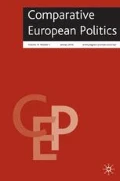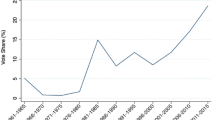Abstract
This article examines the anti-globalization message of three radical right populist parties: the Austrian Freedom Party, the French National Front, and the Italian Lega Nord. Anti-globalization movements have received much attention as of late from social scientists and journalists alike. However, one anti-globalization force that has not received adequate scholarly attention is the radical right. Since the 1990s, radical right parties have emerged as some of the strongest opponents of neo-liberalism, European integration, and immigration. Radical right parties campaign against the elite nature of globalization, arguing that financial and political elites, American hegemony, and the growing influence of the European Union destroy the natural fabric of civil society. The radical right also associates European integration with the forces of globalization and with a loss of national sovereignty. And finally, adopting La Nouvelle Droite's notion of the ‘right to difference’, radical right populist parties associate globalization with multiculturalism and with overly liberal immigration policies. The article then examines both survey data on European sentiments towards neo-liberalism, European integration, and immigration and public opinion polls that highlight the reason why voters support radical right parties. I argue that if we closely scrutinize the reasons why voters support radical right parties, keeping in mind how these same parties frame the issue of globalization, it becomes clear how and why the political message of radical right parties resonates with a small but significant portion of the electorate who demonstrate apprehension towards economic globalization, European integration, and immigration.
Similar content being viewed by others
References
Art, D. (forthcoming) ‘The organizational origins of the contemporary radical right: the case of Belgium’, Comparative Politics.
Austrian Freedom Party. Program: Kapitel X: Faire Marktwirtschaft. http://www.fpoe.at.
Austrian Freedom Party. Program: Kapitel III: Österreich zuerst!. http://www.fpoe.at.
Austrian Freedom Party (2007) ‘Strache: EU-Verfassung: Sozialpolitische Eiseskälte und Globalisierungsdiktatur’, 6 July. http://www.fpoe.at.
Bale, T. (2003) ‘Cinderella and her ugly sisters: the mainstream and extreme right in Europe's bipolarising party systems’, West European Politics 26 (3): 67–90.
Beirich, H. and Woods, D. (2000) ‘Globalisation, workers and the northern league’, West European Politics 23 (1): 130–143.
Betz, H.-G. (1993) ‘The new politics of resentment: radical right-wing populist parties in Western Europe’, Comparative Politics 25: 413–427.
Betz, H.-G. (2002a) ‘Contre La Mondialisation: Xénophobie, Politique Identitaires et Populisme D’exclusion Europe Occidentale’, Politique et Sociétés 21 (2): 9–28.
Betz, H.-G. (2002b) ‘Rechtspopulismus in WestEuropa: Aktuelle Entwicklungen und politische Bedeutung’, Õsterreichische Zeitschrift Fűr Politikwissenschaft 31 (3): 251–304.
Betz, H.-G. (2002c) ‘Xenophobia, Identity Politics and Exclusionary Populism in Western Europe’, in L. Panitch (ed.) Socialist Register, London: Merlin Press.
Betz, H.-G. (2004) ‘Exclusionary populism in Western Europe in the 1990s and beyond: a threat to democracy and civil rights?’, United Nations Research Institute for Social Development, Identities, Conflict and Cohesion Program Paper Number 9.
Betz, H.-G. and Johnston, C. (2004) ‘Against the current — stemming the tide: the nostalgic ideology of the contemporary radical populist right’, Journal of Political Ideologies 9 (3): 311–327.
Biorcio, R. (1997) La Padania Promessa, Milan: Il Saggiatore.
Conti, N. (2006) ‘Party conflict over European integration in Italy: a new dimension of party competition?’ Journal of Southern Europe and the Balkans 8 (2): 217–233.
Corriere della Sera (2002) ‘Bossi: mobiliterò i popoli contro l' Europa stalinista’, 01 March.
Davies, P. (1999) The National Front in France: ideology, discourse, power, New York: Routledge.
Della Porta, D. and Caiani, M. (2007) ‘Talking Europe in the Italian public sphere’, South European Society and Politics 12 (1): 1–21.
Eatwell, R. (1998) ‘The dynamics of right-wing electoral breakthrough’, Patterns of Prejudice 32 (3): 3–31.
Evans, J.A.J. (2000) ‘Contrasting attitudinal bases of Euroscepticism amongst the French electorate’, Electoral Studies 19 (4): 539–561.
Flash Eurobarometer 151b (2007) ‘Globalization’, EOS Gallup Europe.
French National Front. Program. http://www.frontnational.com.
Ignazi, P. (2003) Extreme Right Parties in Western Europe, New York: Oxford.
Ignazi, P. (2005) ‘The Extreme Right’, South European Society and Politic 10 (2): 333–349.
La Padania (2000a) ‘Prima gli oriundi veneti’, 1 August 2000.
La Padania (2000b) ‘Bossi: vogliamo seguire il modello cristiano’, 30 March.
La Padania (2000c) ‘Trincea d’Europa, un’associazione in difesa dei popoli’, 16 March.
La Repubblica (2003) ‘Bossi invoca dazi contro la Cina’, 17 August.
La Repubblica (2005) ‘Lega, da Pontida assalto all’Europa’, 19 June.
Le Monde (2005) ‘Le traditionnel defile du FN placé sous le signe du rejet la Constitution européenne’, 01 May.
Lega Nord (1994) ‘Antitrust per abbattere i monopoli’, December.
Luverà, B. (1999) I Confini dell’Odio: il nazionalismo etnico e la nuova destra europea, Rome: Editori Riuniti.
Mayer, N. (1999) Ces Français Qui Votent FN, Paris: Flammarion.
McGann, A.J. and Kitschelt, H. (2005) ‘The radical right in the Alps: evolution of support for the Swiss SVP and Austrian FPÖ’, Party Politics 11 (2): 147–171.
Mény, Y. and Surel, Y. (2000) Par le people, pour le people: le populisme et les démocraties, Paris: Fayard.
Minkenberg, M. (2003) ‘The West European radical right as a collective actor: modeling the impact of cultural and structural variables on party formation and movement mobilization’, Comparative European Politics 1 (2): 149–170.
Minkenberg, M. and Perrineau, P. (2007) ‘The radical right in the European Elections: 2004’, International Political Science Review 28 (29): 29–55.
Mussa, G., Corti, C. and Ronchi, R. (1998) ‘Padania, Identità e Società Multirazziale’, December.
Padania: Lega Nord (2000) ‘Un’Europa a misura di popoli’, April.
Riedlsperger, M. (1998) ‘The Freedom Party of Austria: From Protest to Radical Right Populism’, in H.-G. Betz and S. Immerfall (eds.) The New Politics of the Right, New York: St. Martin's Press.
Rydgren, J. (2005a) ‘Is extreme right-wing populism contagious? Explaining the emergence of a new party family’, European Journal of Political Research 44 (3): 413–437.
Rydgren, J. (2005b) The Populist Challenge: Political Protest and Ethno-nationalist Mobilization in France, New York: Bergham Books.
Simmons, H. (1996) The French National Front; The Extremist Challenge to Democracy, Boulder, CO: Westview Press.
Spektorowski, A. (2003a) ‘The new right: ethno-regionalism, ethno-pluralism and the emergence of a neo-fascist ‘Third Way’’, Journal of Political Ideologies 8 (1): 111–130.
Spektorowski, A. (2003b) ‘Ethnoregionalism: the intellectual new right and the Lega Nord’, The Global Review of Ethnopolitics 2 (3): 55–57.
Standard Eurobarometer 67 (2007) Brussels, Belgium, June, 2007.
Svåsand, L. (1998) ‘Scandinavian Right-Wing Radicalism’, in H.-G. Betz and S. Immerfall (eds.) The New Politics of the Right, New York: St. Martin's Press.
Thalmhammer, E., Zucha, V., Enzenhofer, E., Salfinger, B. and Ogris, G. (2001) Attitudes Towards Minority Groups in the European Union, Vienna: SORA.
Zaslove, A. (2004a) ‘The dark side of European politics: unmasking the radical right’, Journal of European Integration 26 (1): 61–81.
Zaslove, A. (2004b) ‘Closing the door? The ideology and impact of radical right populism on immigration policy in Austria and Italy’, Journal of Political Ideologies 9 (1): 99–118.
Acknowledgements
I would like to thank the three anonymous reviewers for their helpful comments and suggestions. I would also like to thank Phil Triadafilopoulos for his comments on earlier drafts.
Author information
Authors and Affiliations
Rights and permissions
About this article
Cite this article
Zaslove, A. Exclusion, Community, and a Populist Political Economy: The Radical Right as an Anti-Globalization Movement. Comp Eur Polit 6, 169–189 (2008). https://doi.org/10.1057/palgrave.cep.6110126
Published:
Issue Date:
DOI: https://doi.org/10.1057/palgrave.cep.6110126




